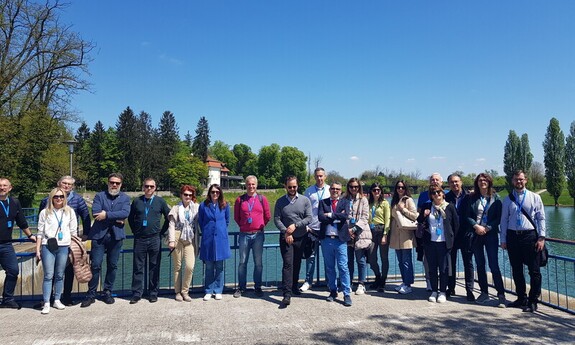
Department of Monument Conservation at the Faculty of Civil Engineering and Architecture takes part in a three-year (04.2023-06.2026) international project entitled "Zero energy buildings for zero energy neighborhoods" (ZEB4ZEN) as part of the Interreg Central Europe program. The project involves scientific units from Croatia - Energy Institute Hrvoje Požar (project leader), Germany - Magdeburg - Stendal University of Applied Sciences, Italy - Energy Management Agency of Friuli Venezia Giulia as well as the historical cities of Zamość, Palmanova, Karlovac and Quadlinbourg as an associated partner. The project budget is EUR 2,041,426.00.
The aim of the project is to develop a methodology and define roadmaps for achieving zero-emission districts based on the experience of pilot actions and investments carried out in historic cities of Central Europe. The project's task is to identify and implement solutions aimed at modernizing city centers while protecting their historical heritage.
In Central Europe, more than 80% of the energy used in residential buildings is used for heating. The historic cities’ centers present a particular challenge. Historical buildings have outdated parameters and, as a consequence, thermal comfort at an appropriate level is often not available. Therefore, in order to protect the environment and ensure an appropriate standard of use, it is necessary to modernize historic residential buildings.
As part of the ZEB4ZEN project, the city of Zamość will carry out an investment process, which will result in a pilot implementation in one of the selected old town tenement houses. Research and pilot works related to thermal modernization will be carried out by the Municipality of Zamość in close cooperation with the team from the Department of Monument Conservation. Thermal insulation works will be carried out only inside the building. All research and pilot works in the Old Town complex will be performed in consultation with the conservation office. After the insulation has been completed using various methods, it is planned to measure the effectiveness of the solutions. Thus, it will be possible to implement and replicate the solutions in other buildings of similar typology.
Based on the experience of scientific partners and pilot implementations in ideal cities: Palmanova - installation of a photovoltaic farm, Karlovac - installation of an integrated photovoltaic power plant, as well as a storage system and V2X charging station, and Zamość, solutions and a structured methodology will be developed to determine the potential of nearly zero-energy districts, which should be taken into account when developing energy action plans for historic cities.


Projekt współfinansowany ze środków Unii Europejskiej w ramach Europejskiego Funduszu Społecznego, Program Operacyjny Wiedza Edukacja Rozwój 2014-2020 "PL2022 - Zintegrowany Program Rozwoju Politechniki Lubelskiej" POWR.03.05.00-00-Z036/17